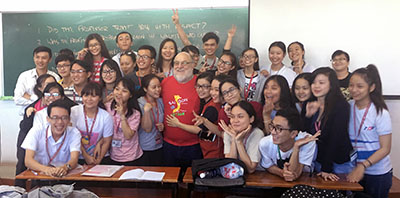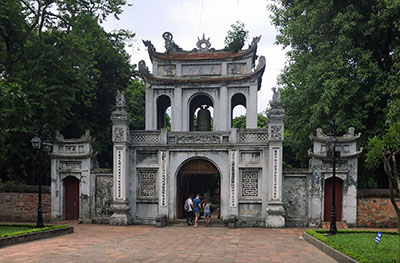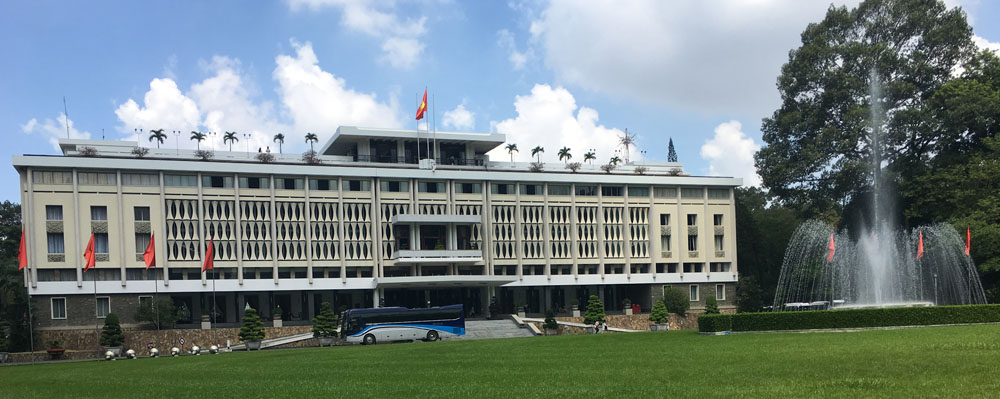 Download PDF of this full issue: v47n2.pdf (94.2 MB)
Download PDF of this full issue: v47n2.pdf (94.2 MB)From Vietnam Veterans Against the War, http://www.vvaw.org/veteran/article/?id=3487
 Download PDF of this full issue: v47n2.pdf (94.2 MB) Download PDF of this full issue: v47n2.pdf (94.2 MB) |
I spent this past summer (2017) in Vietnam, teaching a sociology course at Ton Duc Thang University (TDTU) in Ho Chi Minh City. TDTU is located in the southern part of the city in District 7.

|
| Kim Scipes with his students in Ho Chi Minh City. |
Friends who had previously taught at TDTU had been asked if there were any Americans they knew who had good politics and who might be willing to teach in Vietnam. My friends gave my name to the head of the sociology department, a woman named Le Thi Mai, and she invited me for a conference last year, and then to come back and teach this year.
This was new to me, since I missed the all-expenses paid tours conducted by the US Government in the 1960's and early '70's that so many others "enjoyed." I spent 33 months in Yuma, Arizona at a Marine Corps Air Station, working on avionics equipment on A-4's, while pilots were learning how to bomb and strafe.
As folks probably know, after the country was unified on April 30, 1975, Saigon was renamed Ho Chi Minh City (HCMC). It's a lot larger now, over 9 million people when it was probably between 4-5 million during much of the "American" war. Parts of it today would seem familiar to those who were there previously, but there is so much modern construction currently, that it would seem completely different in many parts of the city. And they are building a subway today, which is definitely needed.
Vietnam suffered economically after the war, in no small part to US revenge and intransigence. Since 1986, with the Doi Moi (reform) program, the country has enticed extensive foreign capital investment, and, based on the backs of its workers and peasants, has been one of the fastest growing economies in the world since 2000. While they haven't eliminated poverty, they have drastically reduced it. Some people are getting very rich. Obviously, there are some problems with this.
Nonetheless, the average person is still pretty poor. There are relatively few cars, many of which are Lexus', BMW's, Range Rovers, etc., but most of the vehicles are motorbikes. Riding through HCMC is truly an adventure. It seems the only traffic law they absolutely obey is the one about only one object being in one place at one time, other than that, it's "game on"! It's not uncommon to see someone begin a left-hand turn at an intersection from the far right-hand side of the horde. Yet, somehow, they make it work. I haven't seen a single accident yet, although I did see one man frown when cut off.
It's hard to say what's going on in the new buildings and government offices, so my comments are only from what I've personally observed while walking/riding around the city, either by myself, although I don't speak the language, or with others, whether on the back of a motorbike, a bus or in a taxi.
One of the things I've most noticed is the caring and kindness to other people. Like I said, even in the chaotic rush hour I've never seen anyone yelling, screaming or threatening other people. The cops don't wear guns or even the big police belts. The only armed guards I've seen have been in a bank when I've gone to exchange money. There are security guards outside many businesses, but none of them are armed and I wonder how many are there simply to soak up excess labor, and thus aren't really needed, and how many are truly there for protection. I never saw any situations where people acted afraid of each other, and I walked around fairly late at night by myself.

|
|
Gate to the university, founded in 1070, The Citadel of Literature. |
Something amazing to me was how welcoming students and folks on the street were of me as an American. They have truly put the war behind them. When I was in Europe in the early 1980's, we never talked about WW II, so, in Vietnam, with 40 years past the war, it's weird but probably not surprising that the war is not much discussed. The only place this came up was, as I traveled through the rest of the country, I kept getting asked how old I was (65 then, now 66). I thought I knew what was going on, but finally had to ask, it was the war, huh? Yep. There really are only a few old people that you see in public, and the government is unprepared for the mobility challenges that will hit as people in their fifties get older. Thank the activists for the American Disabilities Act!
Last year, I visited the War Remnants Museum, which is where they recall the American war. A number of US tanks, artillery, helicopters and even jets are parked outside. Inside are a lot of artifacts from the war, many pictures and equipment we've all seen over the years, but there is also a big area devoted to Agent Orange and its effects, including today. To be honest, I couldn't hang there, and left the museum. There are a lot of hideous pictures being shared.
This year, I visited the old South Vietnamese presidential palace. It's actually a beautiful building, very well designed, built and maintained. As you travel through it, things are explained in Vietnamese and English to accommodate the many tourists who visit. But as I got up on the third and highest level of the building, I looked out and, no sign or anything, saw a recently painted Huey sitting on the outside roof! I guess no comment needed.
They also have replicas of the two tanks that broke through the palace walls on April 30, 1975. One sign even lists the crew members' names.
I was scheduled to teach for eight weeks, but just before leaving, Professor Mai told me they had made a mistake and that students had their internships to go to, so I only had three weeks to teach my course on Qualitative Research Methods! I tore my course apart and completely redesigned it — the students loved it. This is the only university in Vietnam where students must pass a test in English to graduate, so I taught in English with no translation. Over 80% got an 80 or above on their exam. Almost half got an 80 or above after the 30-45 minute interviews they did on improving the educational system at TDTU and writing them up in English! They busted their asses for me and I've been invited back for next summer.
The good thing with the changed schedule is that it allowed me to travel. I went to Nha Trang on the bus. The beaches are incredible, with many Russian tourists today. I took the train to Da Nang, where I rode the cable car up to the Ba Na Hills. A friend of mine who was in the area back in the day thinks it was up Charley Ridge, but the clouds came in and I could see nothing but one small wire as we went up 1,500 meters! But just looking down at the terrain we crossed, my respect for those who humped those hills only grew, there was a reason I went into Marine Air! And then took the train to Ha Noi. Just like they break the name Sai Gon into two words, they break Hanoi into Ha Noi.
I really like Ha Noi, not nearly as chaotic as Ho Chi Minh City. I visited a university that had been founded there in the year 1070, before any university in Europe. It was established to train people to run the state apparatus for the Chinese. And we thought we were going to beat them! I went to the Museum of the Revolution and I visited the old French colonial prison called Hoa Lo Prison, part of it is where they held American fliers shot down over the north and perhaps is better known as the Hanoi Hilton. However, I can say one thing, no matter how bad the US prisoners had it, it was nothing compared to what the Vietnamese revolutionaries jailed by the French suffered. This was what was called hard time. Unfortunately, I didn't get the chance to visit the Ho Chi Minh Mausoleum.
The most enjoyable thing that I stumbled on in Ha Noi was on Friday night. In the center of the city is Hoam Kiem Lake, it reminds me of Lake Merritt in Oakland. The night I was there, there were tens of thousands of Vietnamese out, enjoying a warm summer night, walking on the lakeside, getting ice cream for the kids. It was so relaxed, friendly, and peaceful. I walked around the entire lake before heading back to my hotel.
In all, a fascinating trip, where I met some amazing people. Worth checking out again, this time unarmed.
Kim Scipes, Ph.D., served in the Marines as an enlisted man from 1969-73. Four the past 14 years, he's been teaching at (the renamed) Purdue University Northwest in Westville, IN.

|
| The Presidential Palace. |